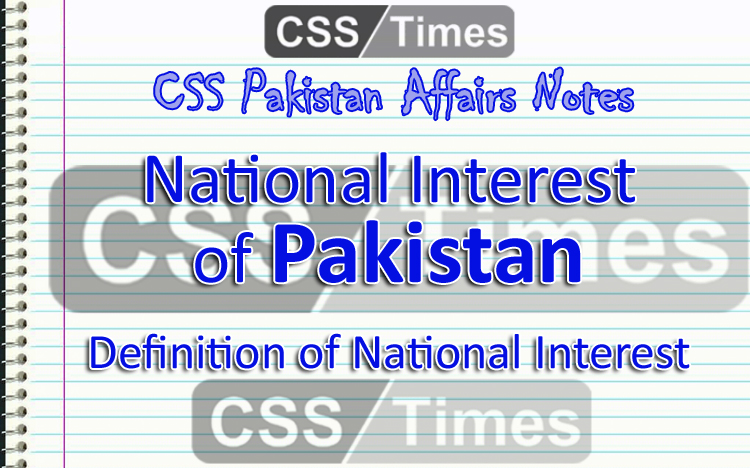National Interest of Pakistan | Definition of National Interest (Part-II)
Within this context what should be the role of our foreign policy? Since foreign policy has to serve the national interest it is not supposed to have an independent agenda of its own, independent, that is, of the national interest. It will of course have a very detailed agenda of its own. But it must flow from the agreed priorities of the national agenda. The national interests are many and varied. The standard list of what constitutes the national list is available from the Objectives Resolution and the Principles of Policy of the Constitution of Pakistan as well as any text book on politics and international relations. However, the essence of our national interest lies in the transformation of a pre-modern underdeveloped country in which the vast majority of the population is kept poor, uneducated, exploited and without hope by a narrowly based coalition of elite groups into a modern, economically developed and politically participatory democracy comprising educated, free and empowered citizens. If it is not this, it is nothing.
Our foreign policy’s major task is to contribute to this transformation. Any country with such a transformation national agenda needs an enabling neighborhood and external environment for its implementation. In addition it needs to maximize the quantity and quality of its economic growth in order to garner the resources required for the transformation agenda. Accordingly, our foreign policy must not only be conducted within these parameters but it must also contribute to the strengthening of them. It must contribute to meeting our development and security challenges, handling our bilateral, regional and international relations, the development of international understanding for our stand on a whole range of issues, developing a positive image of the country abroad on the basis of concrete achievements, etc. It must also contribute to mobilizing resources through economic cooperation, FDI, regional arrangements, market access and preferential arrangements, etc., that facilitate the maximum possible rate of growth. Narrow agendas that undermine the prospect of implementing a national transformation agenda and a foreign policy designed to facilitate it, neither serve the national interest nor the specific cause they claim to serve. National Interest of Pakistan
The real world is more complicated of course. Let us take the cases of Kashmir and nuclear weapons. In light of the transformation agenda and the need for a peaceful neighborhood and maximizing economic growth, how much priority should we give to the Kashmir dispute? We must, of course, always support the Kashmiri right of self-determination because that is their right. It is not ours to confer or to withdraw as General Musharraf blithely assumed. It is an internationally recognized right. It is a legal obligation of the international community, including Pakistan, to press India to meet its obligation in this respect. But it is not an enforceable right because it was adopted by the UN Security Council under Chapter 6 of the UN Charter and not Chapter 7 under which Security Council resolutions are enforceable. However, an occupied and oppressed people who have been forcibly denied the right to self- determination, freedom and independence do have an inherent and recognized right to resist that situation, through armed struggle if necessary, and to seek international assistance for that purpose. Pakistan is a designated party to the Kashmir dispute and it has a moral and legal obligation to support the UN resolutions on Kashmir and to support the Kashmiri struggle for its inalienable rights. National Interest of Pakistan
Read also: China-Russia Relations and the US-China-Russia Triangle
The question is how do we do this? Through diplomatically seeking a compromise settlement? Through going to war with India? Through assisting armed Kashmiri resistance fighters against the Indian occupation forces? Or through some combination of all three options? And how do we square our choice with the need for a peaceful neighborhood and maximizing the rate of our economic growth? Whatever choice is made, it should be legal, it should respect human rights particularly those of the Kashmiri people, it should be effective in facilitating the aspirations of the Kashmiri people, and it should not altogether undermine our bilateral relationship with India, because without a modus vivendi with it the neighborhood and growth conditions for implementing our national transformation agenda cannot be fulfilled. That obviously should eliminate certain options mentioned above if we have the interests of our own people in mind. But we don’t throw principle to the wind. We find policies, strategies and tactics that allow us, as best as possible, to effectively support the Kashmiri people while maintaining and developing ties with India. National Interest of Pakistan
What if India does not cooperate? What if it says either abandon your support for Kashmiri rights or be ready for tense and conflictual relations with us at the expense of your national agenda? That would complicate the situation, as it has. But we still do not give up on principle. We will need to defend ourselves against any Indian aggressive designs or intimidation. But we do not go looking for trouble. We do not allow ourselves to be accused of abetting terrorist acts as we have consistently done. We take all the tough decisions to ensure this. On this basis, we strive to persuade India that it is in the interests of both countries to find mutually acceptable solutions that are, above all, acceptable to the Kashmiris. We look for win-win processes and not zero-sum solutions. Zero-sum solutions are not stable and zero sum strategies are always more costly for smaller countries. To the extent we are able to do this, we increase our standing and weight in the councils of the world, and we make it difficult for any interlocutor to adopt an uncooperative attitude towards our rational positions. A belligerent or irrational Pakistan would be much easier for an adversary to handle. We need to be wise. National Interest of Pakistan
Let us take the case of nuclear weapons. A conventionally superior India defeated and humiliated us in 1971 tearing away our eastern half. The US proved to be an insufficient ally. Even China could not take our chestnuts out of the fire. In 1974 India conducted an atomic test. We had no option but to develop a nuclear weapons capacity as an equalizer to the superior conventional military power of India. Otherwise, India would never take us seriously. It was Zulfikar Ali Bhutto who negotiated the Simla Agreement for a modus vivendi with India. But he also insisted on acquiring a nuclear weapons capacity to preserve the credibility of our policy. In 1998 India called our bluff and went nuclear. Much to India’s consternation we answered in full measure. Vajpayee came to Lahore in 1998. We went to Kargil in 1999. India responded short of an all-out attack on us. They were deterred from crossing the Line of Control or the international border by our nuclear capability. This enabled the US to bring about an end to the confrontation on mutually acceptable terms. Three years later, in 2002, as a result of a terrorist attack on the Indian parliament in Delhi, India blamed Pakistan and raised the ante by deploying its military along our borders to browbeat us into submitting to its demands. We stood our ground. Once again the Indians blinked, and the US was able to negotiate an end to the confrontation? So nuclear weapons are absolutely essential to preserving our security and independence. Right? National Interest of Pakistan
Check also: International Relations MCQs
Unfortunately, for all those who see the possession of nuclear weapons as an emotional imperative, an objective analysis does not so clearly support the case for nuclear weapons. If we assume that none of our domestic and foreign policies will alter, the dysfunctional elite will continue to determine our priorities and strategies, relations with India will remain as they are forever, and the international community will continue to ignore our just demands and fail to reward us sufficiently, both militarily and economically, then a case for a nuclear deterrent can be made – even though it would still not be a convincing case, since it would certainly be at the expense of our transformation agenda. But if we were to re-orient our domestic and foreign policies to bring them in conformity with our transformation agenda as, for example, suggested in the case of the Kashmir dispute, then although difficulties and differences with India may still take a very long time to overcome, the probability of a confrontation scenario in which a nuclear deterrent becomes essential will dramatically decline. National Interest of Pakistan
But what if India goes mad? Maybe some rotten leadership gets elected to office, performs so abominably that it faces political extinction at the next polls, and the Kashmiri people rise in armed revolt against intolerable corruption and savage repression, could not such a government seek political redemption through a war of annihilation against Pakistan? It must be admitted that to the extent that such a scenario is possible, Pakistan would need a defense capacity including possibly a nuclear deterrent capacity. But even in this case, questions arise. Would a nuclear deterrent be the only available option against an India that becomes stupidly belligerent? How likely is such a scenario, and should we concentrate our resources on it to the exclusion of other more likely scenarios? Of course, one has to prepare for worst case scenarios, but if in doing so, we undermine our transformation agenda then what kind of options will we be able to develop vis-a- vis India in order to temper its behavior towards us, including bringing about the settlement of long standing disputes on mutually acceptable terms? Moreover, if we insist that our security situation leaves us no option but to develop a nuclear deterrent capability, then how can we argue that Iran which faces an existential threat from Israel and its main supporter should refrain from doing so? And what about scenarios in which the umbrella of a nuclear stalemate is used to prosecute splendid little wars without fear of excessive escalation? How do we probe the extent of each other’s nuclear deterrent without running the risk of the nuclear deterrent failing? After all nuclear weapons are not meant to be used. Of course, the answer to this extremely complicated issue lies in the settlement of long standing disputes and in the nuclear weapons states being more sincere with respect to their nuclear disarmament obligations under the NPT. This is not meant to oppose our nuclear policy. It is meant to suggest that the case for it is not that straightforward, and it has to be placed within a context, and that is our transformation agenda. Outside of this context, as one Pakistani commentator recently observed, we will be protecting our nuclear assets rather than our nuclear assets protecting us. Once again, we need to be wise. National Interest of Pakistan
Demagogues and mountebanks of one kind or another can always pretend to offer simpler solutions which, as we have seen time and again over the past 60 years, harm the people’s interest in a better future for their children. They need to be progressively sidelined. There are ways in which this can be done. The exposure of disgusting personal greed and low cunning at the highest levels speaking the language of high principle, lofty idealism and devotion to the people, is one way. The exposure of goons and thugs posing as defenders of democracy, both at home and abroad, is another. Principled, imaginative, realistic, and committed popular leadership will be required. Consultations and communication leading to an informed public opinion will be required. Diplomatic and other technical capacities will need to be developed. All the tracks of diplomacy will need to be coordinated into an integrated approach. A culture of peace and compromise will need to evolve. All this will take time, patience, persistence and faith. It will never be easy or free of personal cost. But any other approach will sooner or later mean a betrayal of the national transformation agenda – and that will be an anti-people and anti-Pakistan approach. And silence in the face of such an approach will eventually become complicity. National Interest of Pakistan
This is the approach we will need to adopt with respect to all items on our national and foreign policy agenda to ensure that it remains consistent with our national transformation imperative. We need to remember just one rule to have a very good idea of what our policy on any domestic or foreign policy issue needs to be. Any policy, or policy response, on any issue that in practice undermines the priority and the implementation of the transformation agenda is against the national interest. Apart from Kashmir and the nuclear issue which has an immediate impact on the level of conventional spending, if, for example, we cite the war on terror, the defense of the country, the ideology of Pakistan, the need to preserve the unity of the country, the need to improve relations with the US or any other country, the need to maintain law and order, the need to improve the investment climate, the need to keep the deficit under control, etc., etc., as justifications for the consistent and deliberate denial of sufficient resources for the nation-wide implementation of programs of education, health, protection of human rights, social welfare, generation of high employment and high value job creation, human and physical resource development, etc., etc., for the people of Pakistan, then, whatever we say, and whatever patriotic pose we strike, we are in fact abetting the decline and demise of our country. Once we know and act upon this truth, we can all begin to contribute to the saving of our country through participating in the discussion, formulation and conduct of policy on a hundred tracks, including the foreign policy track. National Interest of Pakistan
Summary: National Interest of Pakistan
- Water problems in Pakistan result largely from poor management, but the consequences of management failures are accentuated, both materially and politically, by international and subnational hydro politics.
- There is enough water in the Indus basin to provide for the livelihoods of its residents for a long time, provided that the water is managed efficiently and equitably and that additional water is made available not just through storage but, more importantly, through higher efficiency and intersectoral transfers. National Interest of Pakistan
- The Indus Waters Treaty (IWT) seems to moderate the worst impulses of India and Pakistan toward each other, and perhaps therein lies IWT’s greatest strength. National Interest of Pakistan
- Pakistani engineers typically interpret the IWT’s extensive technical annexures very literally, whereas the Indian engineers tend to emphasize the treaty’s criteria for techno-economically sound project design.
- No single completed or proposed Indian project on the three western rivers of the Indus basin alone has the potential to significantly limit flows of water to Pakistan. But the long list of proposed Indian projects on the rivers will in the future give India the cumulative storage capacity to reduce substantively water flows to Pakistan during the low-flow winter months.
- The IWT, by performing an amputation surgery on the basin, made matters simple and allowed India and Pakistan to pursue their nationalist agendas without much need for more sophisticated and involved cooperation in the water field. This lack of cooperative sharing of water leaves the ecological and social consequences of the treaty to be negotiated and contested at the subnational scale.
- The interprovincial conflict over water distribution in Pakistan has potential—albeit entirely avoidable—repercussions for stability, at both the subnational and international levels.
- Instead of constructing very expensive, environmentally damaging, and economically dubious water-storage megaprojects in Pakistan, enhancement of the existing infrastructure’s efficiency, coupled with better on-farm water management and more appropriate irrigation and farming techniques, would perhaps more than make up for any additional water that might be gained from megaprojects.
- Since the drought in southern Pakistan in the latter half of the 1990s, the single-minded focus of the Pakistani water bureaucracy on water development has made the issue of the construction of the Kalabagh Dam project a surrogate for a litany of Sindhi grievances against the Punjabi-dominated political, military, and bureaucratic system in Pakistan.
- The emphasis on maximizing water withdrawals and on greater regulation of the Indus river system contributed to accentuating the very high flood peaks in 2010. Although the floods are being used by the pro-dams lobby to call for construction of more storage on the Indus, the tragedy ought to inspire a more nuanced and comprehensive reevaluation of the water-management system in the basin. National Interest of Pakistan
- The IWT is a product of its time and could be fruitfully modified and renegotiated to bring it more in line with contemporary international watercourse law, the Helsinki rules, and emerging concerns with water quality, environmental sustainability, climate change, and principles of equitable sharing. But that renegotiation, if it ever happens, is going to be contingent upon significant improvement in bilateral relations between India and Pakistan. National Interest of Pakistan
- India could be more forthcoming with flow data and be more prompt and open in communicating its planned projects on the Indus basin to Pakistan, particularly in the western basin.
- Pakistan can engage with India within the context of the IWT more positively than defensively, and also educate its media and politicians so as not to sensationalize essentially technical arguments by presenting them as existential threats. National Interest of Pakistan








[…] Click to Continue reading […]
How to download informative materials from here please add option to download In PDF file.
Thanks.